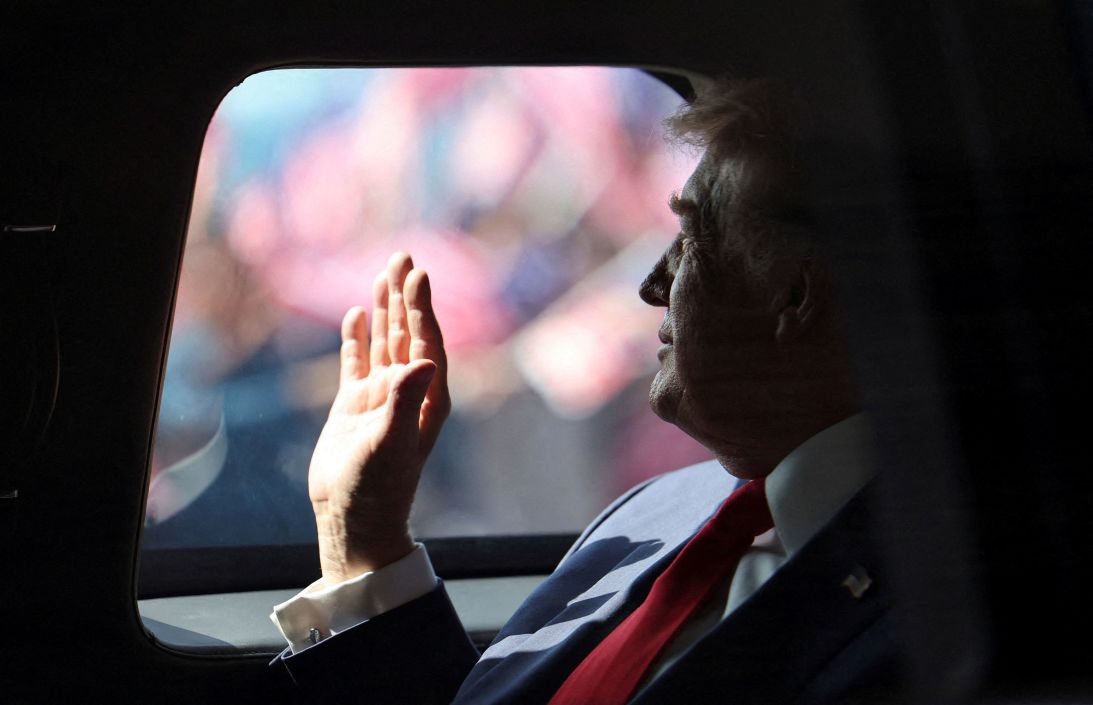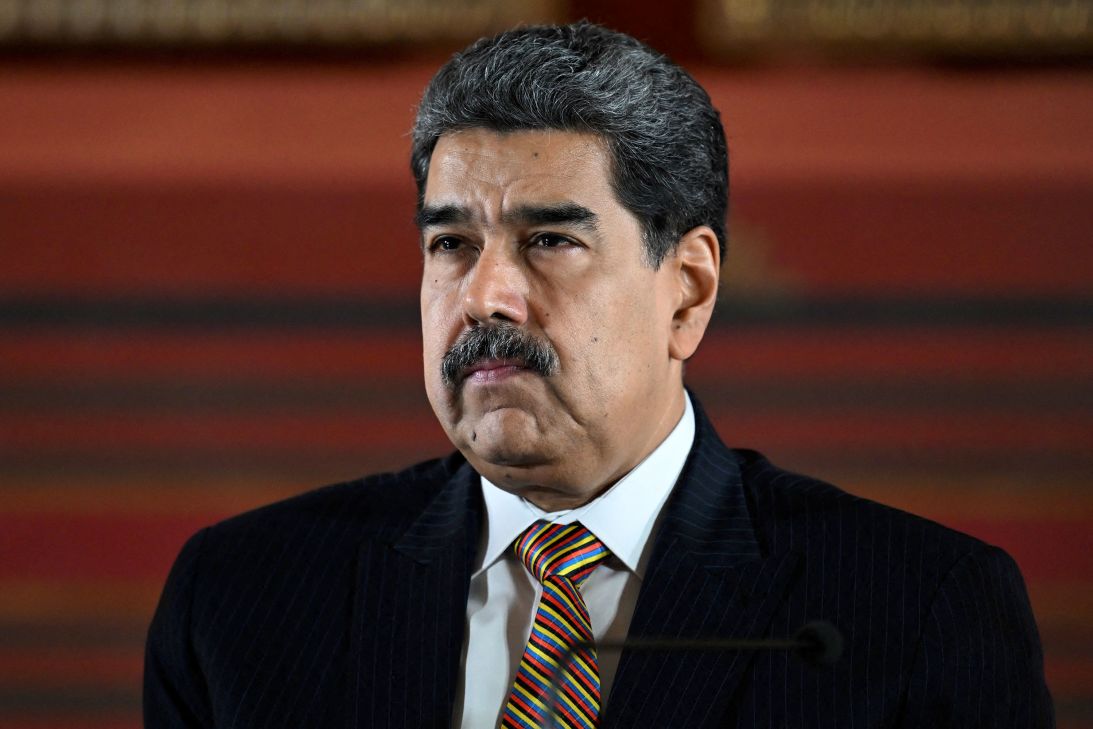

It doesn’t take America’s most lethal aircraft carrier, its F/A-18 jets and a flotilla of US Navy warships carrying dozens of Tomahawk missiles to blast a few speedboats out of the Caribbean.
So as the USS Gerald R. Ford steams from Europe to join an already formidable US naval and air force in the region, expectations are rising that the Trump administration may escalate what it claims is an assault on drug traffickers.
The first target of this new 21st-century gunboat diplomacy is Venezuelan President Nicolás Maduro, an election-denying dictator. The Ford will deliver a giant hint to Maduro to go, or for Venezuelan army officers to oust him. Or it could serve as the platform not just for attacks against alleged cartel targets but also to change the regime.
“You don’t move a battlegroup all the way from where it was to the Caribbean unless you’re planning on either to intimidate the country … or you’re going to start conducting combat operations in Venezuela,” Democratic Sen. Mark Kelly of Arizona said Sunday on ABC’s “This Week.”
Top Trump aides have portrayed Venezuela as a major route for fentanyl and other drugs that kill Americans, even if evidence shows little drugs production in the country and far more significant transit routes elsewhere. They claim Maduro is at the head of a network of cartels. The administration has authorized the use of military force against such groups and declared gang members “unlawful combatants,” seeking to legally justify killings that that deny due process.

President Donald Trump is meanwhile considering plans to target cocaine facilities and alleged drug trafficking routes inside Venezuela, three US officials told CNN last week, but has not ruled out diplomacy. He’s also relishing a string of strikes against what officials claim are cartel boats. “We’re going to kill them, you know, they’re going to be like, dead,” the president said Thursday. He might be in Asia, but there’s a rising drumbeat of war closer to home.
Sen. Lindsey Graham suggested Sunday that land strikes in Venezuela were “a real possibility.” The South Carolina Republican told CBS’ “Face the Nation” that Trump told him Congress will be briefed on “future potential military operations against Venezuela and Colombia” when he gets home. “I think President Trump’s made a decision that Maduro, the leader of Venezuela, is an indicted drug trafficker, that it’s time for him to go,” he said.
Trump’s pressure on Venezuela is just one prong of a widening US strategy to leverage US power and Trumpian values in the Western Hemisphere and to push out China. This has seen the administration turn up the heat on leaders in Brazil, Panama and Colombia. On Sunday, Trump’s strategy scored a notable win when the party of Argentine President Javier Milei won big in midterm elections. The US president had made a $20 billion economic bailout offer contingent on voter support for Milei — a hero of his MAGA movement.
“BIG WIN in Argentina for Javier Milei, a wonderful Trump Endorsed Candidate! He’s making us all look good. Congratulations Javier!” Trump wrote on Truth Social. The president might be in Asia, but his gaze was also in Latin America.
US strikes on Venezuela would test law and evoke dark omens for regime change
Possible US strikes on land in Venezuela would raise political, legal and geopolitical questions for an administration that has still not provided proof to the public about drugs cargo on at least 10 speedboats it has crowed about obliterating: eight in the Caribbean and two in the Pacific.
► The Constitution states that Congress formally declares war, not a president. So, a unilateral decision by Trump to start a new conflict in Latin America would further erode legal checks on military action presidents have been watering down for decades, especially following the attacks on September 11, 2001. Graham insisted Trump doesn’t need sign-off from Congress. “The game has changed when it comes to narco-trafficking drug organizations. We’re going to take you out,” he said.
But the lack of a new authorization would suggest that Trump could simply just start wars anywhere he wants at any time. The GOP-led Congress would demean itself further by enabling a president to award himself the power to kill anyone on the high seas. “When you kill someone, you should know … if you’re not in a declared war, you really need to know someone’s name, at least you have to accuse them of something. You have to present evidence,” Kentucky Sen. Rand Paul said on NBC’s “Meet the Press” this month.

Trump is already surfing close to the line. The War Powers Act, for instance, gives a president 60 days to use military force before congressional authorization is required. That period would expire in early November if backdated to the first attack on a speedboat on September 2. Any action against Venezuela on land “would have to be in response to an armed attack against the United States, would have to be necessary, would have to be proportionate, and would have to be authorized by Congress. None of those things, none of those boxes are checked off,” Ryan Goodman, a professor at the New York University School of Law, told CNN’s Erin Burnett this month.
► A new war in Venezuela would come with political implications, especially for Trump’s “America First” base, which embraced his promises of no new foreign entanglements. But Trump, armed with a Supreme Court ruling that says he’s immune from prosecution for any official acts and a Republican congressional majority that enables his undemocratic instincts, seems not to be listening.
► And what would US attacks would mean for the citizens of nations involved? Many Venezuelans would love to shake off Maduro’s iron grip, which wrecked their country’s wealth. Yet military action risks civilian casualties and mistakes, and can sometimes unite civilians even around a tyrannical regime. Regime change can also go badly wrong — like in Iraq or Libya so far this century. And CIA-backed coups and wars against cartels in Latin America have a painful history.
► A new US war in the Western Hemisphere could also foster a backlash against a US government already meddling in the region’s politics. Trump seems to have his eye on Colombian President Gustavo Petro after Maduro and attempted to sway Sunday’s elections in Argentina. He’s also been pressuring Brazil.
► US-sponsored regime change would also set a brazen precedent at a time of strongmen who cultivate regional spheres of influence. This would weaken US arguments against potential Chinese expansionism, including against Taiwan, and undercut US moral authority over Russia’s invasion of Ukraine.
Why some Americans might back a new US war
The test of any presidential action overseas is whether it promotes the well-being of Americans. Trump has made this more explicit than ever — putting national interests above alliances, international institutions and global free trade.
In the abstract, stemming the flow of drugs into the United States, including fentanyl, which kills tens thousands of Americans each year, would be a good thing. And no one would be surprised if speedboats targeted by the US were involved in low-grade smuggling. Still, most supplies of fentanyl come over land via Mexico and China, not Venezuela.
But many Americans voted for Trump because he vowed to end uncontrolled migration. Ousting Maduro could tamp down Venezuelan arrivals at the US border and encourage some of those who fled the country to return.
So, commentary that sees potential US action in the Western Hemisphere as anti-America First tells only half the story. The administration’s strategy in the region is an outgrowth of domestic immigration and crime policy, so it is more applicable to Trump’s political creed than it might seem.
Trump would surely take steps to try to prevent Venezuela turning into an Iraq-style quagmire. But his policy could be troubling nevertheless. His new threats to Latin American leaders reflect his wish to apply personal political power everywhere, often with little regard for the Constitution. His administration is also reviving historic zeal for US presidents to dominate their own backyard.
Trump admires President William McKinley, mostly for his tariff policy. But the 25th president also waged the Spanish-American War, acquiring sovereignty over Puerto Rico, as well as Guam and the Philippines. This administration also draws comparisons to President James Monroe, whose doctrine of 1823 signaled to European powers the US would not tolerate further colonization or interference in the Western Hemisphere.
A MAGA-fied Monroe Doctrine replaces European powers with China and to a lesser extent Russia. Both have long sought a diplomatic and strategic footing with nations close to the US, including Cuba. “The United States is committed to countering China’s corrupt influence in Central America,” Secretary of State Marco Rubio wrote on X on September 4. Early this year, the top US diplomat traveled to Panama to demand steps to weaken China’s influence over the Panama Canal.
Rubio, the son of Cuban immigrants, has long been a hawkish foe of left-wing dictators in Latin America. His advocacy is now creating a powerful front with the more domestic and migration-focused concerns of another administration heavyweight with Trump’s ear: Stephen Miller.

One question that would follow a US operation against Maduro is whether any US success would lead to a wider toppling of left-leaning governments across the region in a realignment mirroring Trump’s worldview.
But if the US is trying to thwart Chinese imperialism, many observers see an attempt to impose American hegemony over Latin America instead. Trump slapped a 50% tariff on Brazil after it prosecuted his friend former President Jair Bolsonaro over a coup attempt. The administration made a hero of Salvadoran tough guy Nayib Bukele, and sent undocumented migrants to one of his brutal jails. Trump is also hostile to Petro, a former Marxist guerrilla and liberal leader in Colombia whose policies clash with the MAGA vision.
A new government in Venezuela — an oil-rich nation to which US oil firms would love to return in a big way — would fulfill multiple Trump goals.
The tightening relationship between Trump’s team and opposition leader and Maria Corina Machado suggests Washington sees her party, which polled better than Maduro in last year’s fraudulent election, according to foreign observers, as heir apparent. Machado, the new Nobel Peace Prize winner, has campaigned for democracy and freedom of expression. Her strong advocacy of Trump suggests her right-wing views would make her a kindred political spirit. “It was Maduro who declared a war on us Venezuelans after we won by the landslide in the presidential election last year,” Machado told Fox News’ “Sunday Morning Futures.” “Maduro is the one who started the war. President Trump is stopping the war.”
Still, arguments that Trump is motivated by promoting democratic freedoms in Venezuela would be a stretch because of his own attempts to destroy the verdict of US voters in the 2020 election and the legal alarms already set off by his hardline Latin America strategy.
This story and headline have been updated with new developments.